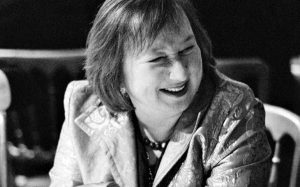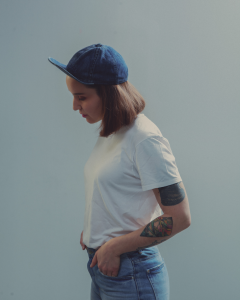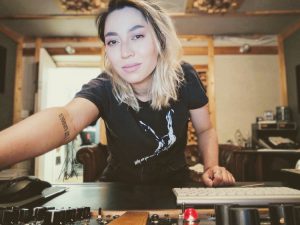When we think of music we often focus solely on the artists, but a significant part of sound creation involves an extensive team, most notably producers and songwriters. But unlike the pattern in many industries currently growing in diversity, equity, and inclusion, female-identifying music producers have been nearly absent in Canada. Music Publishers Canada (MPC) recognized this, and set out to help change it.

Margaret McGuffin
“There is such a low incidence of producers who are women, gender-fluid, non-binary, or gender non-conforming, that have an opportunity to produce,” explains Margaret McGuffin, CEO of Music Publishers Canada. “[An ongoing] USC Annenberg Inclusion Initiative study revealed only 2.5 percent of albums [in the U.S.] were being produced by women. And between 12 to 15 percent, depending on the year, had songwriters who were women. That number says it all. We believe that those numbers are even lower in Canada, which is quite shocking, given how women are doing in other fields.”
McGuffin believes that the absence of female-identifying producers reflects a great number of missed opportunities for talented creators, and the industry itself. “[Many] women don’t understand that there are opportunities in these fields, as they enter into their careers or their post secondary education,” she says. “And even once they’re in those careers, if they don’t see women in those roles, they don’t understand the opportunities that exist there. Or they may not feel comfortable in reaching out and trying to be part of [it].
“Songwriting, publishing, [and] composing are the best kept secrets in the industry. People know about the artist, label, even the manager, [but] they don’t understand that we have so many successful songwriters, composers, and producers worldwide. We’re trying to educate [people] about this segment of the music industry.”

Sarah MacDougall
Formed in 2019, the Women in the Studio National Accelerator program is a series of curated workshops that cover everything from technical training, to branding, to financial literacy, to creative and networking experiences. The program is led by leading Canadian music publishers Vivian Barclay (Warner Chappell Music), Cheryl Link (peermusic Canada), and Mishelle Pack (Sony Music Canada). At press time for this article, SOCAN’s A&R team was setting up a series of virtual song camps for all of the participants.
The program finds participants joining for a variety of reasons. “Some are coming with quite extensive technical training and are looking to master new skills,” says McGuffin. “A lot want to meet a community and network. While [for] others, its more about the music they’re wanting to produce – nobody in the studio understood the sound they had in their head.”
That holds true for singer-songwriter Sarah MacDougall, who’s been producing since she acquired her first four-track tape machine when she was 13 years old. While collaborating on her music has helped her grow as an artist, her passion for production also drives her.
“I studied production and composition in university, and at the Banff Centre, and also worked as an intern and assistant engineer in some commercial studios,” says MacDougall. “I produced and engineered my first record. I worked at a studio that had an SSL 4000G board and a great live room, and I recorded myself in the control room, and the band in the other room. But since then, I’ve been collaborating and co-producing. I learned so much from it over the years.
“At the same time, I always had a dream to have my own studio. In the last few years, I’ve been able to convert the first floor of my house into a studio, and I’ve really dived into production and engineering again. I really like to create a song from start to finish, and collaborate with other songwriters in that way, as well as get my ideas out quickly. I see production as another tool in my songwriting toolbox.”

Elisa Pangsaeng
Like MacDougall, fellow 2021 alumnus Elisa Pangsaeng feels producing is a passion. “When you’re producing– especially when you’re producing and engineering – not only do you get to tell a story, you get to imagine all the ways it could be told. You get to bring it to life with all the colors of all the instruments, orchestration, players, personalities, environments, microphones, processing. There’s sheer artistry in production, but it’s also math, science, technology, it’s psychology. Production is everything a creative mind could ever want.”
And she hopes that the Women in the Studio program continues to shed a bright light on neglected creators. “I’d like to see the narrative surrounding statistics in our industry change,” she says. “I’d like people to stop asking, ‘Where are all the ‘X’ producers?’ We’re right here, we’re everywhere. If you’re in the industry and you ‘don’t know any women producers,’ you’re not giving someone the credit or title they deserve. I’d love to see those in a position to do so ask themselves why they don’t work with more women, or non-binary people, or people of colour, because there’s certainly no excuse not to. I believe programs like this have the potential to highlight that fact.”
For McGuffin, the series isn’t just a program, but a community. “You can never leave,” she says. “We’re in our third year. This is about building a community. Connecting to the elders. We regularly pull in past participants to meet the new ones. We keep in touch with them. Let’s build something that lasts well beyond the program.”
Top Ten: The 2021 Program Participants
- Ava Kay
- DJ Killa-Jewel (aka Julie Fainer)
- Elisa Pangsaeng
- Lana Winterhalt
- Mour (aka Cassandra Zingone)
- OBUXUM (aka Muxubo Mohamed)
- Sadé Awele (aka Folasade Akinbami)
- Sarah MacDougall
- Sierra Noble
- Steph Copeland